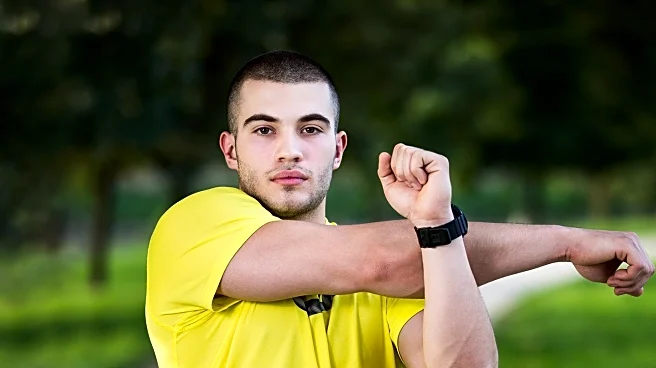What is the story about?
What's Happening?
Researchers at the University of Minnesota have found that stretching the upper back muscles can lead to a significant drop in blood pressure. This discovery was made during a study involving 24 adults who were referred to the University of Minnesota Medical Center for symptoms of lightheadedness or near-fainting episodes. Participants were instructed to roll their shoulders to their ears, lean backward slightly, and flex their upper back for 10 to 15 seconds. The study observed a dramatic drop in blood pressure without a corresponding rise in heart rate, which is typically expected when blood pressure falls. This response is believed to be linked to the parasympathetic nervous system, which may explain the calming sensation experienced after stretching.
Why It's Important?
The findings from this study could have significant implications for individuals with high blood pressure. Understanding the mechanism behind the drop in blood pressure during stretching could lead to new methods for managing hypertension. The research suggests that simple maneuvers, such as stretching, could potentially be used to lower blood pressure in people with mild hypertension. This could offer a non-pharmacological approach to managing blood pressure, providing an accessible and cost-effective option for many individuals. Additionally, the study opens the door for further research into the cardiovascular responses triggered by muscle stretching, which could enhance our understanding of human physiology.
What's Next?
The research team plans to further investigate the exact mechanism causing the drop in blood pressure during stretching. They aim to determine whether this phenomenon occurs in a broader population beyond the young adults initially studied. Future studies may explore the potential for using stretching exercises as a therapeutic intervention for hypertension. Researchers are also interested in confirming whether the observed cardiovascular response is due to a reflex and signals from the brain. These efforts could lead to new strategies for managing blood pressure and improving cardiovascular health.
Beyond the Headlines
The study highlights the potential for simple physical activities to influence physiological responses, which could have broader implications for stress management and overall well-being. The connection between muscle stretching and the parasympathetic nervous system response may offer insights into non-invasive methods for promoting relaxation and reducing stress. This research underscores the importance of exploring the body's natural responses to physical activity and how they can be harnessed for health benefits.
















